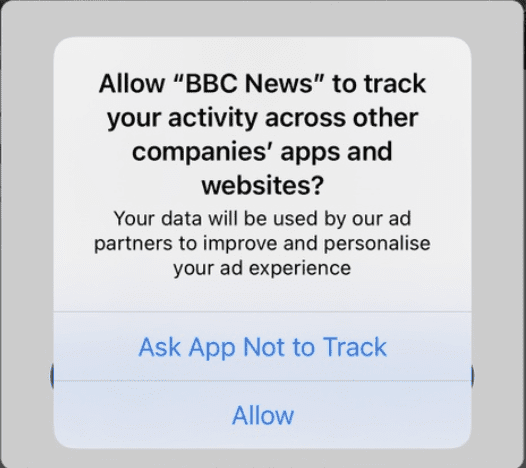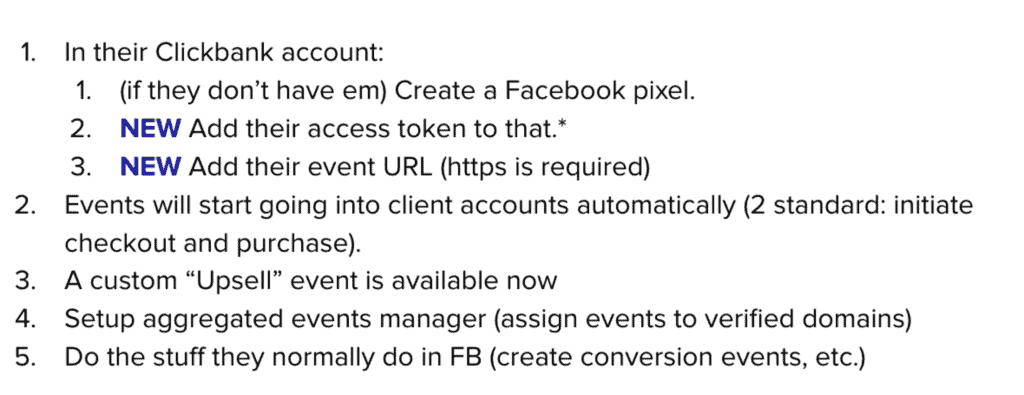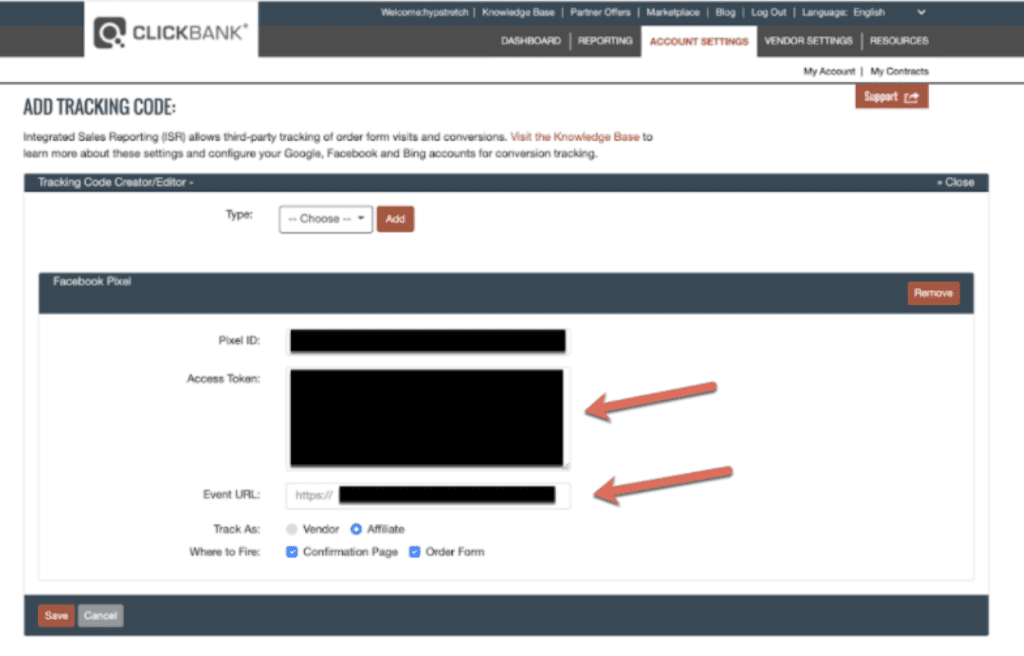Well, it finally happened.
The long-awaited iOS 14 update from Apple is live. Deep breaths, everyone!
We’re not here to sugarcoat it: Apple’s new transparency policy does represent a serious shift to many long-standing aspects of digital advertising, especially on Facebook. If you’re used to doing things a certain way, it’s a shock to the system.
As product owners and affiliate marketers, you should be paying attention, but try not to worry TOO much – our talented Product team has already implemented several powerful changes to the backend on ClickBank to ensure continuity for detailed tracking on our marketplace. Learn more about our Integrated Sales Reporting feature here or watch the video below!
With all that said, iOS 14.5 is still a huge disruption to online marketing as we know it. Read on to discover what’s different, what’s the same, and how you can best respond to the iOS 14 update so that your business comes out even stronger! (And to discover what’s going on with email privacy, check out our post on the iOS 15 Apple privacy update.)
What Is This iOS 14 Update, Anyway?
In case you haven’t been following it closely, the new Apple iOS 14.5 update is the culmination of a long-term trend toward greater user data privacy.
In fact, privacy expectations have already driven a lot of change to online marketing in the last few years. Back in 2018, we saw it with the EU’s General Data Protection Regulation (GDPR), which required clear disclosures about data collection on websites and applications. You’ve also heard about it in the forthcoming death of the third-party cookie by 2022.
But in a dramatic moment on April 26, 2021, Apple changed everything by no longer allowing apps to track users’ activity by default. Instead, Apple now prompts users to opt into tracking across apps like Facebook or Instagram at the OS level.
What Does the Change Mean in Plain English?
In a nutshell, iOS users will no longer have their activity tracked unless they explicitly consent to it!

It’s all part of the AppTrackingTransparency (ATT) framework. Apps that collect and use data – such as Facebook, Instagram, news apps, and mobile games – will have to serve a prompt to iOS users and get an explicit “Allow” response to continue tracking.
Without this consent from users, key apps will have less data available to offer personalized and targeted ads – including the holy grail of online advertising, Facebook.
What Happens to Affiliate Marketing on Facebook?
One of the most attractive parts of advertising and affiliate marketing on Facebook has always been how specific and accurate you could get with targeting your audience and tracking metrics like conversions.
Unfortunately, the demand for greater privacy could significantly change how Facebook ads work. Here are several of the biggest changes:
- A shift from browser-based to server-side tracking
- A shift from individual data to aggregated events
- A requirement for domains to be verified
- A shift to a maximum of 8 events to track per domain
- A shift to event tracking with only one event per user session (by priority order)
- A reduction in the attribution window to 7-day click and 1-day view
- A 72-hour reset period after making changes to conversion events
Put simply, you’re likely to see less precision in who is targeted or excluded from your ads, which could mean higher costs for campaigns. The changes to event measurement also mean less concrete conversion data, so you’ll want to shift to mixed marketing models that are based on aggregated data to inform your marketing campaign decisions.
Many of our top affiliates are media buyers on Facebook, so we know these Facebook changes can impact how you generate traffic for affiliate offers. But it’ll take some time to see how dramatic the shift will be in terms of available data.
To continue to supply Facebook with data from ClickBank, we’re now using the server-side Conversions API.
How Affiliate Marketers Can Adjust to Privacy Changes
Whether you’re an active Facebook advertiser or you just use Facebook on occasion in your business, it may seem like the sky is falling. But it’s not as bad as it seems!
For one thing, adoption of iOS 14.5 will be gradual, not immediate. We’ll have time to see changes and adapt, because the rollout isn’t going to be instantaneous.
Second, not everyone who gets the ATT prompt will say “No” to data tracking (although so far, the vast majority of iOS users seem to be doing so).
Third, not ALL users and customers are on iOS – so while these changes are undoubtedly big, they aren’t universal. (See Google’s response to the ATT prompt on Android.)
As for what to do about it? Here are 3 recommended action items.
1) Learn Everything You Can About Facebook’s Changes
The best way to move forward is to understand the potential impact on your Facebook advertising.
First, there’s a new Facebook resource center with a personalized checklist of tasks to guide advertisers through the actions you can take.
Aside from this list of recommendations, it’s worth jumping into Facebook Ads Manager and simply looking at your delivery and conversion data by device and platform. Start there and just see how much of your data is actually on Apple devices – that will help put things in perspective.
2) Implement ClickBank’s Integrated Sales Reporting Feature
If you’re a platinum customer or on your way to platinum, we want to make sure you’re aware of ClickBank’s official tracking solution, which is now live.
Our new Integrated Sales Reporting feature requires your pixel ID, your access token, and your verified domain from Facebook.

If you give us those 3 pieces and put that in your tracking code tool in ClickBank, you will get 3 events from ClickBank:
- “Order Form” maps to Facebook’s standard Initiate checkout. FB standard event.
- “Confirmation Page” maps to Purchase event. FB standard event. (NOTE: The new structure allows multiple purchase events for initial sale, each upsell, and the value toggle, which sets up 4 value-based events for the purchase event for more granular purchase data.)
- “Confirmation Page” also allows you an optional Upsell event. A custom event to track upsells in your FB Ad Manager.
You can map these to the checkboxes in our UI for the events you want to track.

The good news is, ClickBank is now providing you with richer data on Facebook events compared to what we saw before!
With that said, you may still see some random errors or messages in your Facebook account, which doesn’t mean that it’s not working.
You should also expect further changes from Facebook, ClickBank, and our partners as we all acclimate to the new environment.
3) Follow the Data and Stay Tuned
As marketing professionals, we all know that testing and data analysis are key.
However, this isn’t a small adjustment – it’s a seismic change! That’s why you should be looking at this as a hard reset.
Think of the expression, “Past performance is no guarantee of future results.” With so much up in the air, that’s how we should think about campaigns for now. Don’t look to your pre-iOS 14.5 data to give you answers on what will happen next.
Instead, we recommend you pay close attention to the data you collect through Facebook’s CAPI and establish a new baseline going forward. The new data may not settle into a pattern for several months, but this is how we’re approaching it on our end as well.
Most of all, just keep an eye on the news and follow our blog for any updates. This issue isn’t going away – it’s only going to get more attention. So, stay tuned!
iOS 14 Update Wrap-up
Big changes like iOS 14.5 could mean big headaches, big opportunities, or a little bit of both. We just don’t know yet what’s going to happen and how it’ll affect everyone, which is why it’s important to stay vigilant and focus on what’s in your control. You can learn more about the latest paid ad trends in our guide to Native Ads vs Facebook Ads.
Here at ClickBank, we’re committed to maintaining the functionality you need for continued business success. If you ever have questions or need help, please don’t hesitate to contact us for support!
And again, if you haven’t already, be sure to set up tracking with ClickBank’s Integrated Sales Reporting feature.







